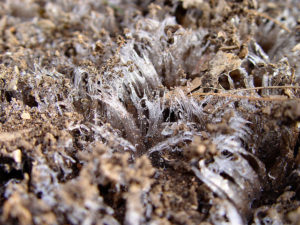 If you want to keep your garden beautiful and healthy throughout the winter season, the most effective way is to cover it with a blanket of winter mulch. You are probably used to spreading mulch on your spring garden to protect new plants and to smother out annoying weeds. Your winter garden also needs special protection and can benefit from a good layer of mulch. It provides a safe haven for the dormant plants that will come up again in a couple of months.
If you want to keep your garden beautiful and healthy throughout the winter season, the most effective way is to cover it with a blanket of winter mulch. You are probably used to spreading mulch on your spring garden to protect new plants and to smother out annoying weeds. Your winter garden also needs special protection and can benefit from a good layer of mulch. It provides a safe haven for the dormant plants that will come up again in a couple of months.
Mulch is used on the surface of the soil as a protective barrier. Some of the most common mulches used are crushed stone, hemlock mulch, and bark mulch. These mulches also come in different sizes and grades. It protects plant roots in the frigid winter temperatures and prevents them from being shifted around in the soil by the wind. When you mulch your garden in the winter, you will also be helping it fight soil erosion by ice and snow. According to an online article from the University of Vermont Extension Department of Plant and Soil Science, mulching is a must for perennial plants.
To get the full benefits of winter mulch, it is recommended that you mulch your garden with at least 2-4 inches of a good organic mulch. This protective layer will keep your soil warmer underground where tender roots are sleeping during the winter. You will also be providing a nourishing food supply for beneficial microbes, insects, and worms in the cold season. When spring comes, they will show their gratitude by offering benefits to your plants, such as killing pests and harmful bacteria.
You can use winter mulch in other places in your yard besides the flower and vegetable beds. Mulch is also helpful to use around all of your shrubs, trees, and other ornamental plants. Crushed stone creates beautiful pathways around your property and around the beds. When snow-covered, mulch creates an interesting texture to the winter landscape.
Gardening experts recommend that you get an early start on your winter mulching. You can get ahead of early frosts if you cover your shrubs, trees, and annual beds with a good bark mulch layer. Roses and other ornamental plants thrive in the spring when they are snuggled all winter in a warm bed of mulch. You will also be smothering out weed seedlings before they even get a chance to wreak havoc on your garden.
Your local garden center will help you choose the mulch that is best for you. Mulch bags can be heavy; so it is a good idea to make it a team effort. If you are mulching a large perennial bed or pathway, you can scoop the mulch out with a shovel and spread it evenly with a dirt rake. With smaller beds, you should do it by hand. Keep in mind that you may have to spread a little more mulch as winter progresses. This is due to decomposition and weather conditions.
If you keep your garden mulched well in the winter, you will be glad you did. It will amend your soil with beneficial nutrients and will make spring mulching easier. Best of all, your plants will be healthier and can produce more blossoms and fruit. Those results are what we all want from our garden!
See also “The Benefits of Winter Mulching“
Photo by Scott Robinson on Flickr, using CC license.